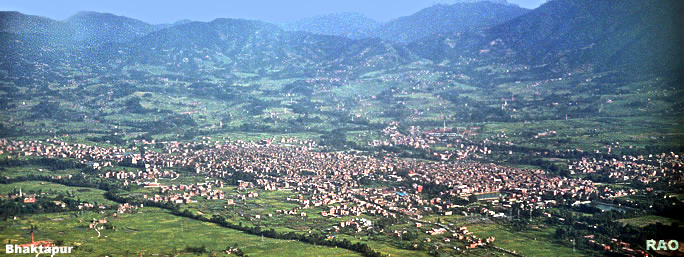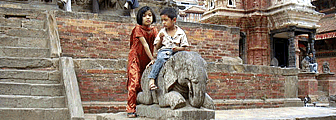 |
Nepal's
Religious Festivals |
|
 |
| Islam:
End of the month of Ramzan - The Eid ul-Fitr-festival |
 |
Nepali
Muslims always are enjoying their biggest festival, Eid ul-Fitr, the first
day of the Arabic month of Shawwal when the crescent moon makes its appearance.
For the thousands of believers in the Islamic faith, the month of
Ramzan is a period of abstinence when Muslims observe Roza or the fast
from dawn to dusk. Muslims believe that Ramzan is the month when their
holy book Quran was revealed to Prophet Mohammed. Throughout this month
they practise abstinence so that the mind and the body is purified. Eid
signifies the end of the month-long fasting and a day to get the blessings
from Allah.
On
occasion of Eid ul-Fitr-festival, Nepali Muslims are eating delicious
things like sebai, (a milk delicacy). The young people are wearing new
cloths and getting pocket money from the elders. On the Eid day, the average
Muslim gets up before dawn, takes a bath, and gets into new clothes before
he heads for the local mosque for Namaaz, the Muslim prayer. Then the whole
day is spent in celebration, exchanging greetings with friends and families
for a propitious year. Most Kathmandu Muslims will be observing their prayers
at the two mosques - Jami and Kashmiri Jami -near Ratna Park. 20,000-30,000
believers are expected in each of these mosques every year. Before the
prayers begin, each Muslim is expected to pay Satkar Fitr, the alms for
the month of Ramzan, which can be either 2.45-kg wheat or money equal to
that. This is different from the usual Jakat, which is 2.5 percent of a
Muslim's wealth that he gives away to those in need.
The
festival is especially heartening for children and women, as they will
be at the receiving end of gifts. It's also mehndi time for the women,
who are busy making all kinds of patterns on their palms and feet.
The
night of the festival eve is regarded as one of great sanctity. The faithful
spend this night in prayers after taking the solemn bath (Ghusl). It is
believed that one who offers six different prayers on this night will be
pardoned off all sins.
 |
March
2008
The
Government in Nepal decided to observe 18 different festivals of various
religions and communities as public holidays and insert them as national
holidays in the government's official calendar.
The
festivals to be observed as public holidays include Eid and Bakr Eid of
the Muslims, Christmas, the Nanak Memorial Day of the Sikhs, Udhouli and
Ubhouli of the Kirants, Goura of the far west and the Tamu and Sonam Lhosars. |
|



